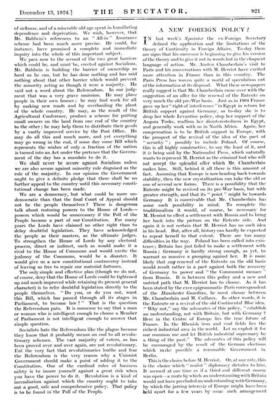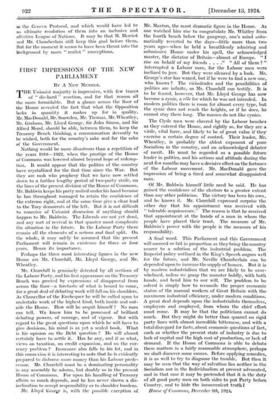A NEW FOREIGN POLICY ?
IN last week's Spectator the ex-Foreign Secretary defined the application and the limitations of the theory of Continuity in Foreign Affairs. To-day there are signs that his successor is beginning to give his version of the theory and to give it not in words but in the eloquent language of action. Mr. Austen Chamberlain's visit to Paris and his conversations with M. Herriot have excited more attention in France than in this country. The Paris Press has woven quite a world of speculation out of the information tit its disposal. What these newspapers really suggest is that Mr. Chamberlain came over with the suggestion of an offer for the renewal of the Entente on very much the old pre-War basis. Just as in 1904 France gave up her" right of interference "in Egypt in return for British support against Germany, so to-day she is to drop her whole Levantine policy, stop her support of the Angora Turks, reaffirm her disinterestedness in Egypt, and generally work with us in North Africa. Again, her compensation is to be British support in Europe, with the -prospect of the revival of the idea of the pact of " security " ; possibly to include Poland. Of course, this is all highly constructive, to say the least of it, and it is being said by the Nationalist Press, which naturally wants to represent M. Herriot as the criminal fool who will not accept the splendid offer which Mr. Chamberlain makes him. Still, behind it all there is this amount of fact. Assuming that Europe is now heading back towards stability, then the new crystallization can take the old or one of several new forms. There is a possibility that the Entente might be revived on its pre-War basis, but with greater strength, and that its " point " might be towards Germany It is conceivable that Mr. Chamberlain has some such possibility in mind. To complete the traditionalism it would, of course, be necessary for M. Herriot to effect a settlement with Russia and to bring her back into the picture on the Entente side. And again it is not certain that M. Herriot has no such idea in his head. But, after all, history can hardly be expected to repeat herself to that extent. There are too many difficulties in the way. Poland has been called into exis- tence; Britain has just failed to make a settlement with Russia ; Germany is hardly strong enough, as yet, to warrant so massive a grouping against her. It is more likely that any renewal of the Entente on the old basis would result rather in a pact against both the recovery of Germany to power and " the Communist menace " from Russia. It is between this policy and a new and untried path that M. Herriot has to choose. As it has been stated by the ever epigranmiatic Paris correspondent of the Manchester Guardian, he must choose between Mr. Chamberlain and M. Caillaux. In other words, it is the Entente or a revival of the old Continental Bloc idea. " Why not," say the advocates of this policy, " establish an understanding, not with Britain, but with Germany ? Here in the Centre of Europe lies the true future of France. In the Rhenish iron and coal fields lies the richest industrial area in the world. Let us exploit it for our common use and let British industrial supremacy be a thing of the past." The advocates of this policy will be encouraged by the result of the German elections which make possible a reasonable Government in Berlin.
This is the choice before M. Herriot. Or, at any rate, this is the choice which " realist " diplomacy dictates to him. It seemed at one time as if a third and different course was open—a route by which an understanding with Britain would not have precluded an understanding with Germany? by which the jarring interests of Europe might have been held apart for a few 'years by some such arrangement as the Geneva Protocol, and which would have led to an ultimate resolution of them into an inclusive and effective League of Nations. It may be that M. Herriot and Mr. Chamberlain still keep this goal before them. But for the moment it seems to have been thrust into the background by more " realist " conceptions.



























































 Previous page
Previous page